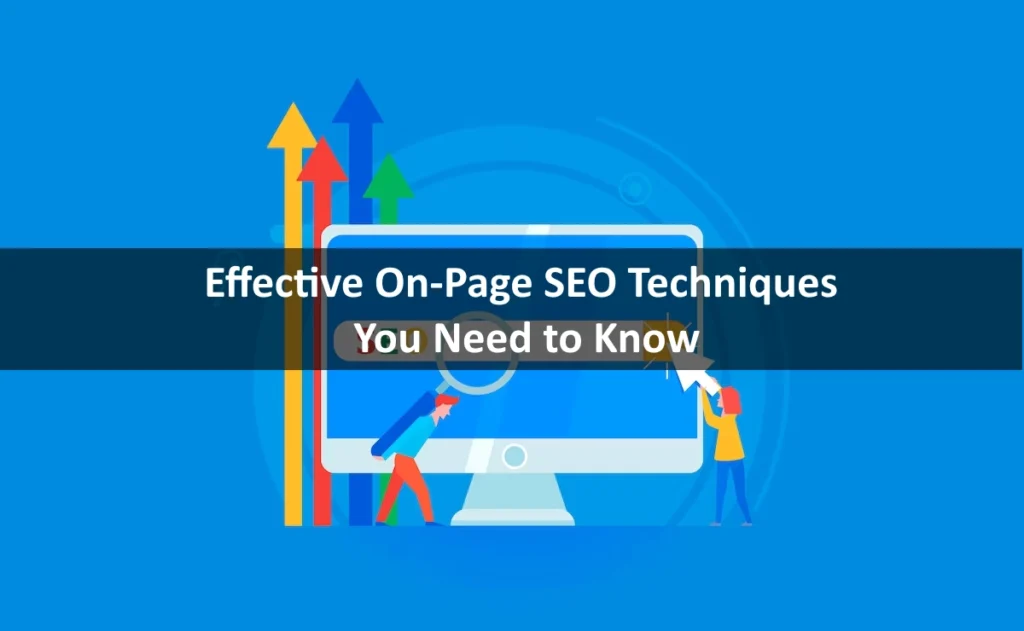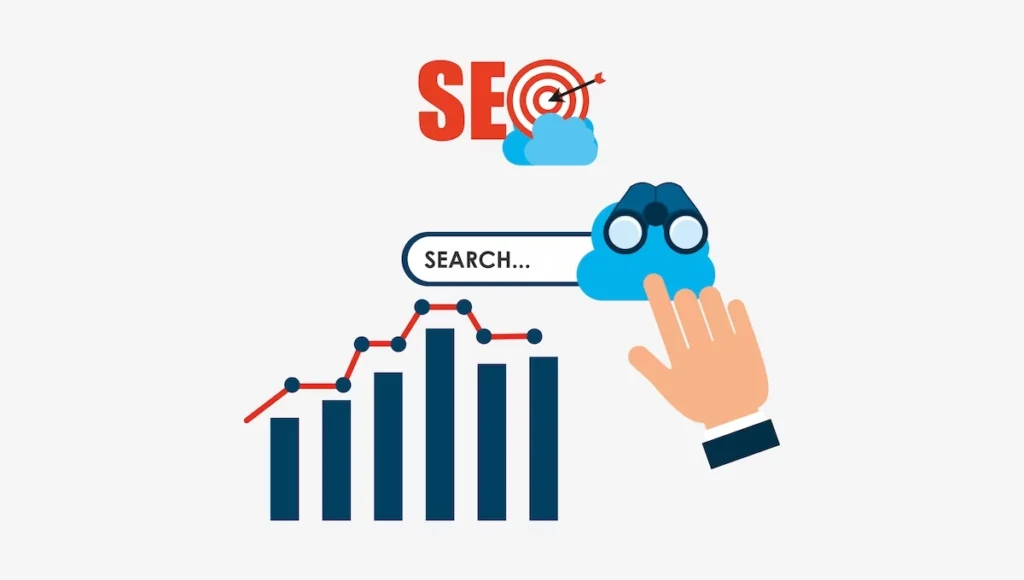In the world of digital marketing, SEO is an essential aspect to rank your website at the top of the search engine results pages (SERPs). On-page SEO refers to the optimization of individual web pages to rank higher and drive more relevant traffic to your website. A successful on-page SEO strategy can increase the visibility of your website, drive more organic traffic, and ultimately increase your revenue. In this article, we will discuss the effective on-page SEO techniques that can help you improve your website’s search engine rankings and drive more organic traffic.

On-Page SEO Techniques
Understanding On-Page SEO
On-page SEO involves optimizing individual web pages to rank higher on the SERPs and drive more relevant traffic to your website. It includes optimizing various elements such as content, title tags, meta descriptions, header tags, image optimization, and many more.
Keyword Research
A crucial component of on page SEO is keyword research. It helps you identify the keywords and phrases that your target audience uses to search for products or services related to your business. Once you have identified the right keywords, you can use them throughout your website to improve your website’s visibility and drive more organic traffic.
Title Tag Optimization
Title tags are an essential aspect of on page SEO. It is the first thing that users see when they search for something on search engines. Optimizing your title tags with relevant keywords and phrases can improve your website’s visibility and increase click-through rates.
Meta Description Improvement
Meta descriptions are small snippets of text that appear under the title tag on the SERPs. Optimizing your meta descriptions with relevant keywords and phrases can improve your website’s visibility and drive more organic traffic to your website.
Header Tags Optimization
H1, H2, H3, and other header tags are crucial for on page SEO. They help search engines understand the structure of your content and make it more user-friendly. Optimizing your header tags with relevant keywords and phrases can improve your website’s visibility and drive more organic traffic.
Content Optimization
Content optimization is an essential aspect of on-page SEO. It involves creating high-quality, unique, and relevant content that engages your target audience and encourages them to take action. Optimizing your content with relevant keywords and phrases can improve your website’s visibility and drive more organic traffic.
Internal Linking
Another crucial component of on page SEO is internal linking. It involves linking your web pages together to improve your website’s structure and make it more user-friendly. Internal linking can also help search engines understand the hierarchy of your website and drive more organic traffic to your website.
Image Optimization
On page SEO includes image optimization as a crucial component. It involves optimizing your images with relevant keywords and phrases, compressing them to reduce the file size, and adding alt text to improve accessibility and search engine visibility.
URL Structure
URL structure is an important aspect of on page SEO. It involves creating short, descriptive, and user-friendly URLs that contain relevant keywords and phrases. Optimizing your URL structure can improve your website’s visibility and drive more organic traffic.
Mobile Optimization
Mobile optimization is an essential aspect of on page SEO. With more and more people using mobile devices to search for products or services, it is crucial to have a mobile-friendly website. In order to deliver a consistent user experience across all platforms, mobile optimization entails optimizing your website’s design, layout, and content.
Page Speed Optimization
A key component of on-page SEO is page speed. Slow-loading pages can negatively impact user experience and increase bounce rates. Optimizing your website’s page speed by compressing images, minifying code, and reducing server response time can improve your website’s visibility and drive more organic traffic.
User Experience (UX)
A key component of on-page SEO is user experience (UX). A website that provides a positive user experience can improve engagement, reduce bounce rates, and increase conversions. Optimizing your website’s design, layout, and content to provide a seamless and intuitive user experience can improve your website’s visibility and drive more organic traffic.
Schema Markup
Schema markup is a kind of microdata that aids search engines in comprehending the information on your website. Adding schema markup to your website can improve its visibility and drive more organic traffic.
Social Media Sharing
Social media sharing is an important aspect of on-page SEO. Adding social media sharing buttons to your website can increase its visibility and drive more organic traffic. It also encourages users to share your content on social media platforms, which can improve your website’s reach and engagement.
Analyzing and Measuring Your On-Page SEO Performance
Analyzing and measuring your on-page SEO performance is essential to improving your website’s visibility and driving more organic traffic. You can use various tools such as Google Analytics, Google Search Console, and other SEO tools to monitor your website’s performance and make data-driven decisions to improve your On-Page SEO techniques.

In conclusion, on-page SEO is a critical aspect of digital marketing that can improve your website’s visibility, drive more organic traffic, and increase your revenue. By implementing these effective on-page SEO techniques, you can optimize your website and improve its search engine rankings. Remember to analyze and measure your website’s performance regularly to make data-driven decisions and continue to improve your on-page SEO.
Also, you can read more about
- The Downfall of Blog Commenting Why It’s No Longer Effective
- Difference between E3 and E5 licenses in office 365
- Collecting Audit Logs in Azure AD: A Step-by-Step Guide
- Bulk Enabling Multi-Factor Authentication in Azure AD: A Step-by-Step Guide
FAQs
Why is on-page SEO vital and what does it entail?
On-page SEO refers to the optimization of your website’s content, structure, and HTML code to improve its search engine rankings. It involves techniques such as keyword research, title tag optimization, content optimization, and internal linking. On-page SEO is important because it helps search engines understand your website’s content and structure, which can improve its visibility and drive more organic traffic.
How can I get relevant keywords for on-page SEO?
To conduct keyword research for on-page SEO, you can use various tools such as Google Keyword Planner, SEMrush, and Ahrefs. Make a list of pertinent subjects and keywords that connect to your website or company to start. Then, use these tools to identify high-volume keywords with low competition and create content around them.
What are the best practices for title tag optimization?
Title tag optimization is an essential aspect of on-page SEO. To optimize your title tags, include your primary keyword at the beginning of the title and keep it under 60 characters. Use descriptive and compelling language to encourage clicks and avoid keyword stuffing. Also, ensure that each page on your website has a unique and relevant title tag.
How do I optimize my website’s content for on-page SEO?
To optimize your website’s content for on-page SEO, start by conducting keyword research and incorporating relevant keywords into your content. Use descriptive and compelling language to engage your audience and optimize your meta descriptions. Also, use H1, H2, and H3 tags to structure your content and make it more readable.
What tools can I use to analyze and measure my website’s on-page SEO performance?
There are various tools that you can use to analyze and measure your website’s on-page SEO performance, including Google Analytics, Google Search Console, SEMrush, and Ahrefs. These tools can help you monitor your website’s traffic, track keyword rankings, and identify areas for improvement. By analyzing your website’s performance regularly, you can make data-driven decisions to improve your on-page SEO and drive more organic traffic.
Don’t forget to support us by following us on Google News or Returning to the home page TopicsTalk
Join Telegram and WhatsApp for More updates
Follow us on social media
